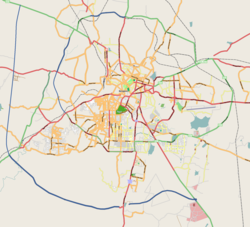Banashankari
|
Banashankari ಬನಶಂಕರಿ |
|
|---|---|
| suburb | |
| Coordinates: 12°56′14″N 77°33′15″E / 12.9373°N 77.5543°ECoordinates: 12°56′14″N 77°33′15″E / 12.9373°N 77.5543°E | |
| Country | India |
| State | Karnataka |
| District | Bengaluru Urban |
| Metro | Bengaluru |
| Zone | Bengaluru South |
| Ward | 155, 156, 158, 161, 163, 164, 165, 166, 180, 181, 197 |
| Languages | |
| • Official | Kannada |
| Time zone | IST (UTC+5:30) |
| PIN | 560050, 560070, 560085, 560061, 560062 |
| Telephone code | 91-80 |
| Vehicle registration | KA 05, KA 41, KA 58 |
| Lok Sabha constituency | Bangalore South |
| Vidhan Sabha constituency | Spread over Basavanagudi, Padmanabhanagar, Bangalore South and Vijayanagar |
Banashankari (Kannada: ಬನಶಂಕರಿ), abbreviated as BSK, is a suburb near to South Bangalore. It gets its name from the Banashankari Amma Temple on Kanakapura Road, one of Bangalore's oldest and well known temples, which was constructed by Subramanya Shetty in 1915.
Banashankari is the largest locality in Bangalore, extending all the way from Mysore Road to Kanakapura Road. It is bound by Girinagar and Rajarajeshwari Nagar in the west, Basavangudi in the north, Jayanagar and J.P. Nagar in the east, and Padmanabhanagar, Kumaraswamy Layout, ISRO Layout, Vasanthapura and Uttarahalli in the south.
Banashankari is the only locality which has all the possible classifications – stage, phase and block. It is divided into 6 stages, with the 6th stage being the largest.
This area is one of the oldest areas in Bangalore. It subsumes areas such as Hanumanthanagar, Srinagar, Nagendra Block, Kalidasa Layout, Raghavendra Block, Brindavan Nagar, Srinivasa Nagar, Vidyapeetha, SBM colony and Ashok Nagar.
This part of Banashankari is well known for the Ramanjaneya Temple and 'Kumara Swamy Devasthana. PES College is also located here.
This area is close to Jayanagar. It is home to eminent persons such as Devegowda, Anil Kumble, [PC Mohan] and Ramesh Arvind. It has two well known hills, Banagiri, housing the Varasiddhi Vinayaka Temple and Devagiri, housing the Venkateshwara Temple. It and its sublocalities mentioned later in the section are a cosmopolitan area (where people from different parts of India having different cultures reside in harmony), unlike the 1st and 3rd stages, which have a predominantly Kannada speaking population.
...
Wikipedia

